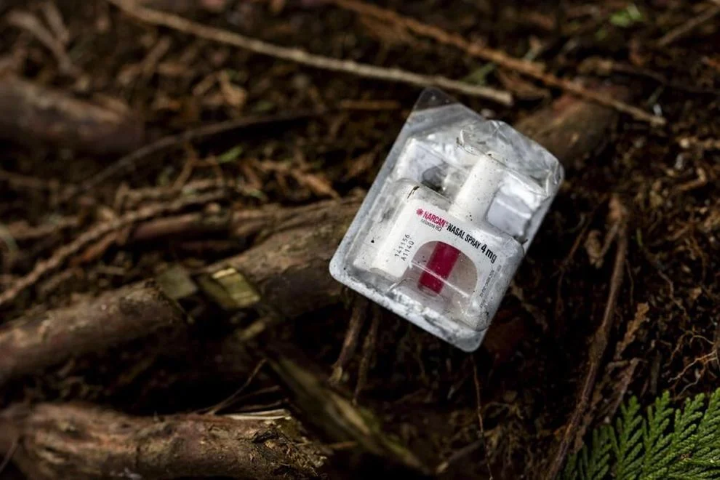
Montreal public health authorities have issued a warning over counterfeit hydromorphone pills that have been linked to several overdoses, including one death. A container of Narcan, or naloxone, sits on tree roots at an encampment in Bellingham, Wash., Thursday, Feb. 8, 2024. THE CANADIAN PRESS/AP-Lindsey Wasson
Montreal's public health authorities have issued a warning regarding counterfeit opioid pills that have been associated with numerous overdoses, including one fatality. These health officials conducted an analysis of several white triangular pills with rounded edges, resembling eight-milligram hydromorphone pills marketed under the brand name Dilaudid.
According to their findings, these pills, although resembling legitimate pharmaceutical tablets, were discovered to contain synthetic opioids that are up to 25 times more potent than fentanyl. Among the substances detected in these counterfeit pills were protonitazepyne, N-desethyl isotonitazene, and nitazenes, all of which pose a significant risk of overdose, especially for individuals who consume them unknowingly.
In light of this alarming discovery, health officials are urging caution among individuals who use street drugs. They advise against using drugs alone and encourage the use of supervised consumption sites as a safer alternative. Additionally, they emphasize the availability of naloxone in pharmacies, which can be administered when someone exhibits signs of an overdose. Such signs include difficulty breathing, producing a gurgling noise, or failing to respond to external stimuli.
The emergence of counterfeit opioid pills containing potent synthetic substances represents a grave threat to public health in Montreal. The deceptive appearance of these pills as legitimate pharmaceuticals increases the likelihood of unsuspecting individuals consuming them, thereby exposing themselves to a heightened risk of overdose and death.
The specific substances found in these counterfeit pills, such as protonitazepyne, N-desethyl isotonitazene, and nitazenes, are particularly concerning due to their potency. These synthetic opioids, often manufactured in clandestine laboratories, far surpass the strength of fentanyl, a potent opioid responsible for a significant portion of overdose deaths worldwide.
The danger posed by these counterfeit pills underscores the importance of public awareness and harm reduction measures. By educating individuals about the risks associated with street drugs and providing access to harm reduction services such as supervised consumption sites and naloxone, authorities hope to mitigate the impact of the opioid crisis on Montreal's population.
Health officials stress the need for vigilance and caution, especially among those who engage in drug use. They advise individuals to be wary of any pills obtained from unofficial sources and to exercise extreme caution when consuming substances of unknown origin. Additionally, they encourage individuals to seek support and assistance if they or someone they know is struggling with substance use or addiction.
The tragic consequences of opioid overdoses highlight the urgency of addressing the underlying factors contributing to substance misuse and addiction. While initiatives aimed at reducing harm and preventing overdoses are crucial, efforts to address the root causes of addiction, such as poverty, trauma, and mental health issues, are equally important.
In conclusion, Montreal's public health warning regarding counterfeit opioid pills serves as a stark reminder of the ongoing opioid crisis and the need for comprehensive strategies to address it. By raising awareness, providing access to harm reduction services, and addressing the underlying factors driving substance misuse, authorities hope to minimize the devastating impact of opioids on individuals and communities alike.















